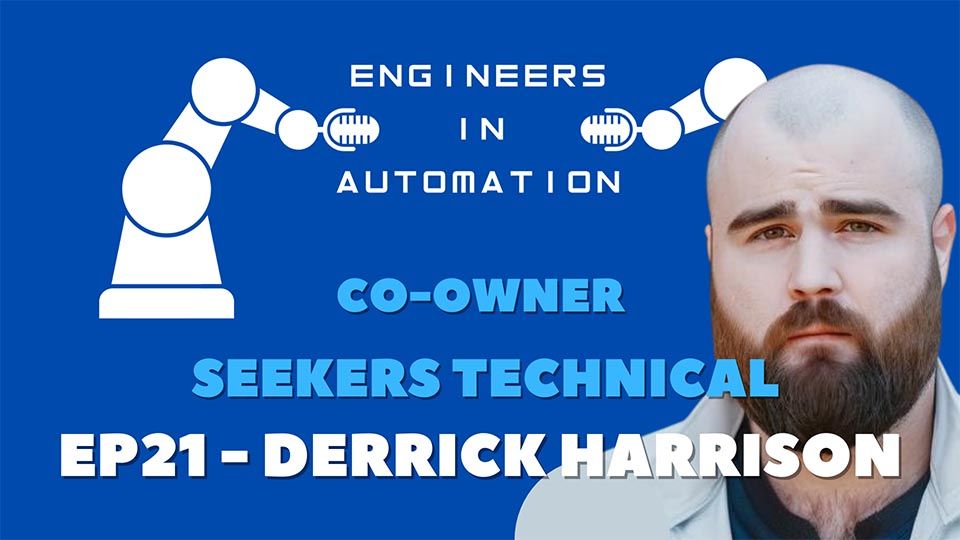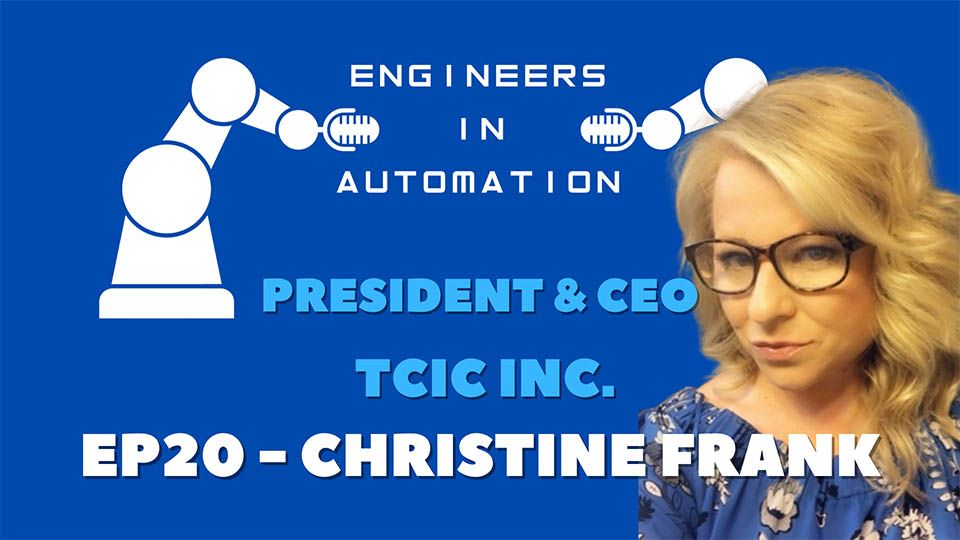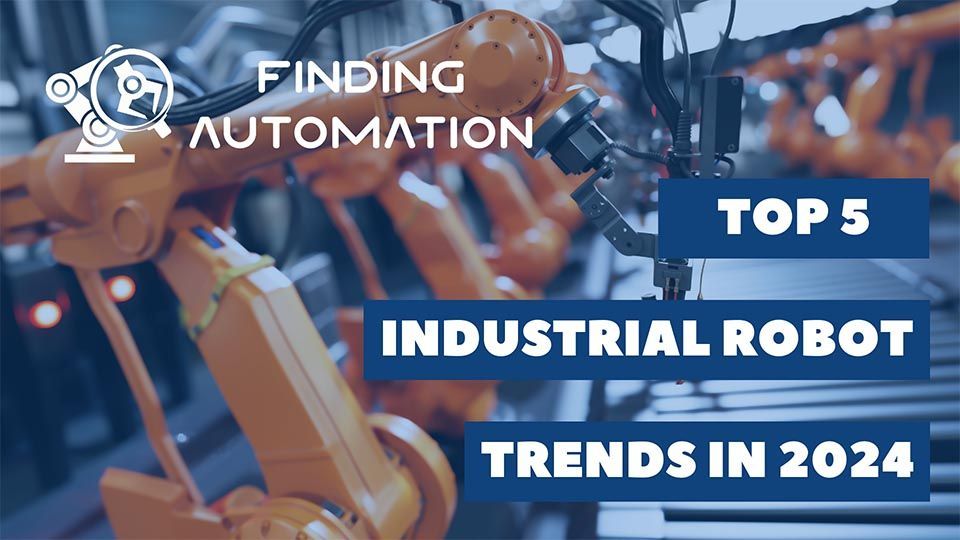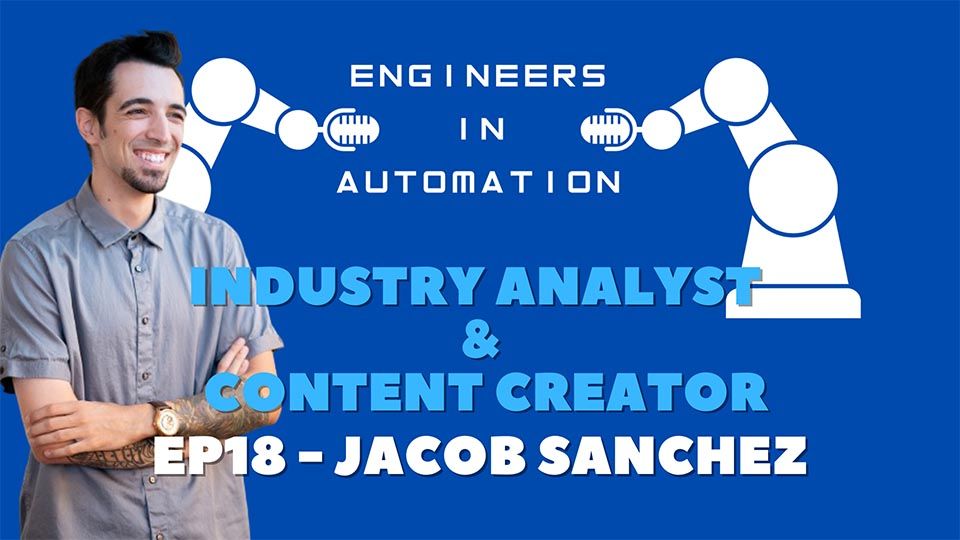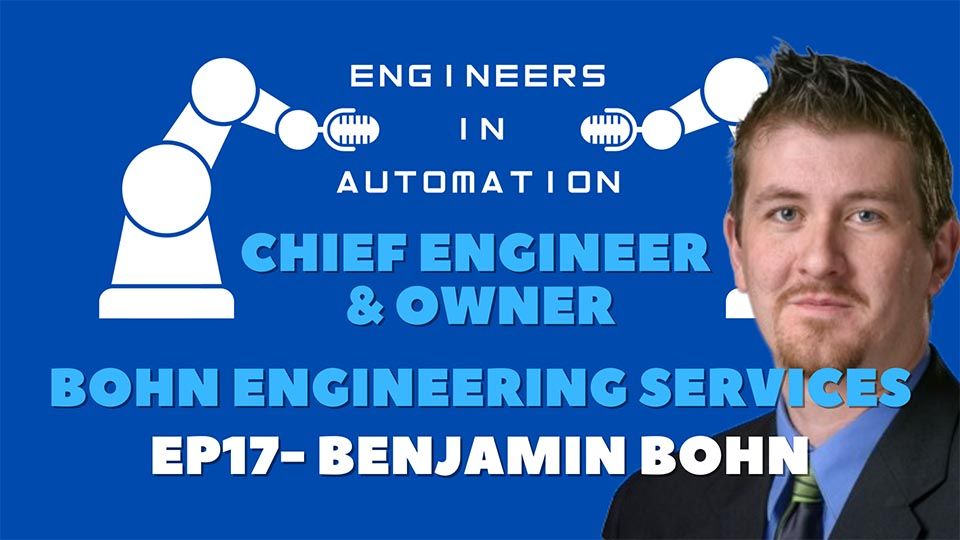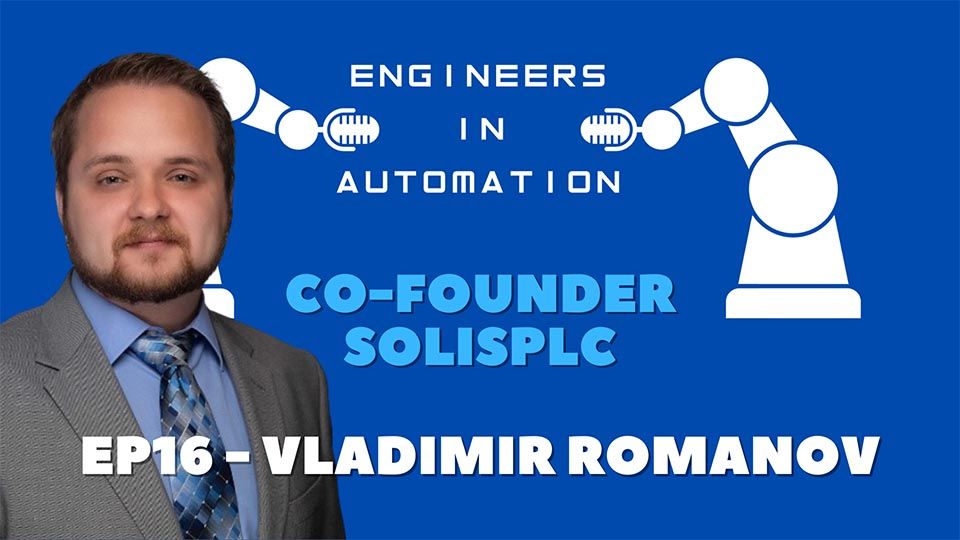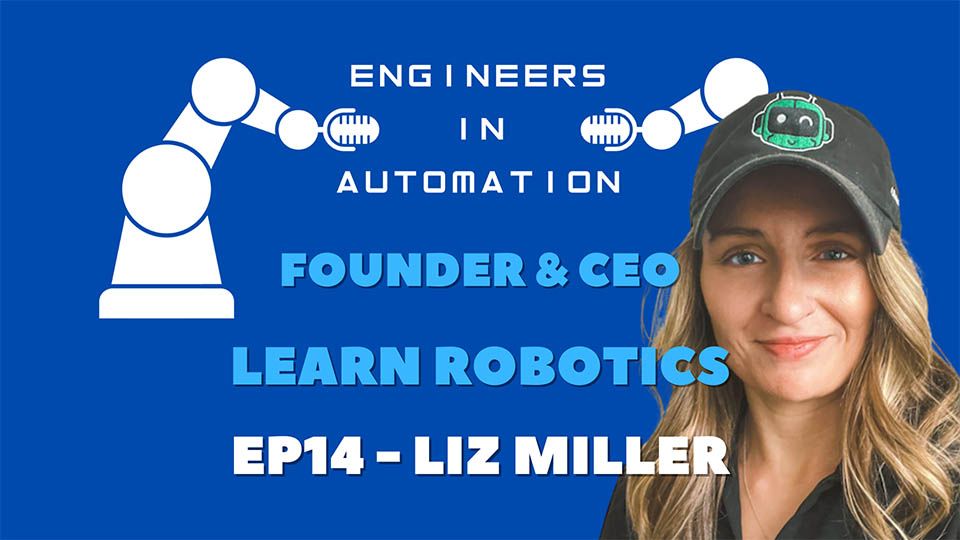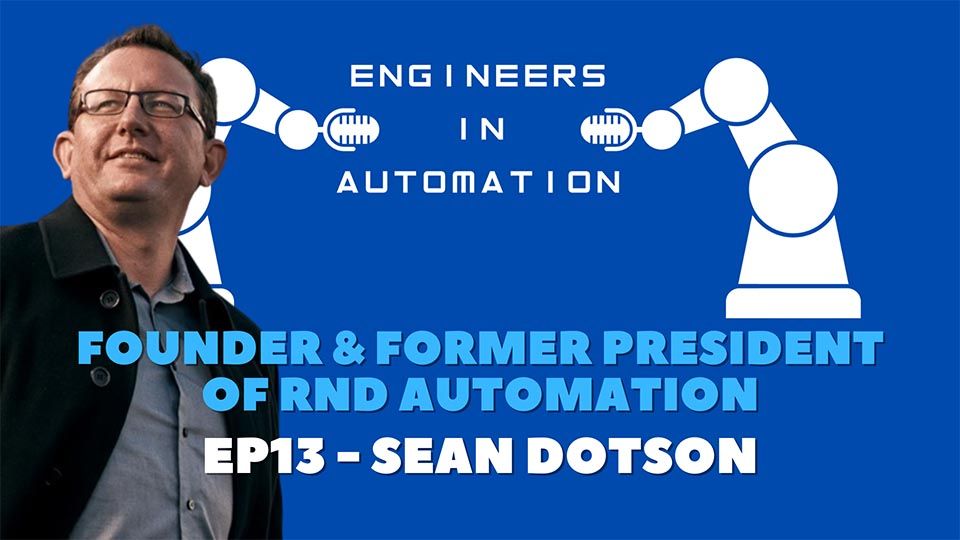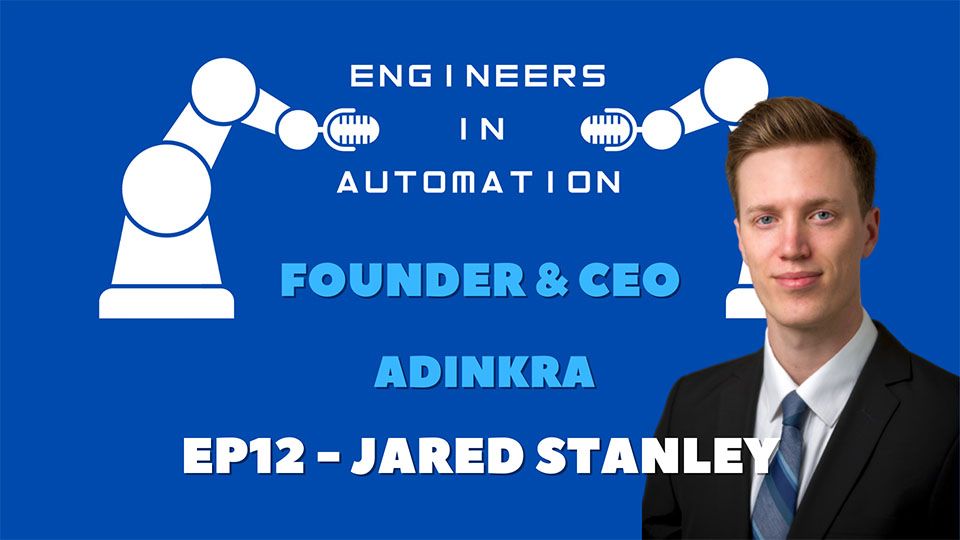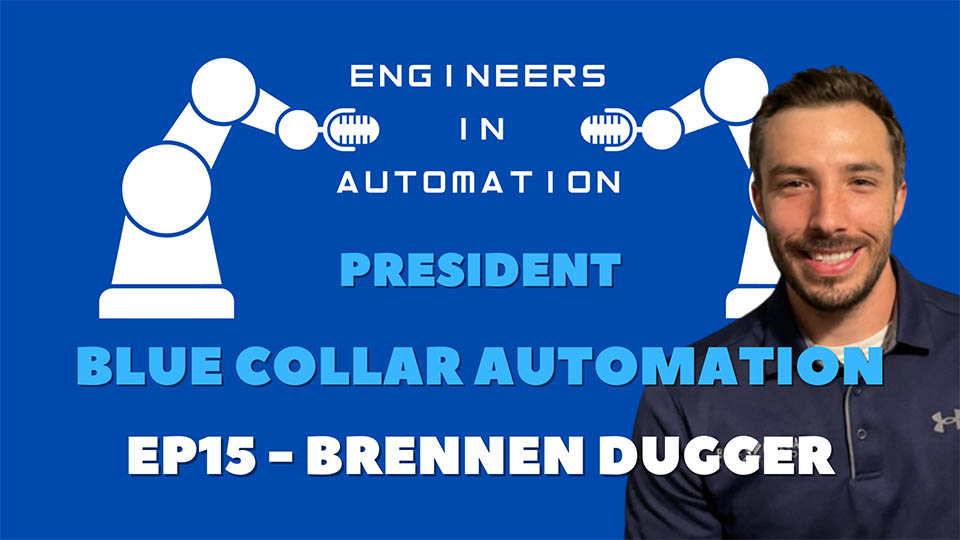Alicia Gilpin | Process & Controls Engineering
Engineers in Automation - Alicia Gilpin | Episode 19
In this episode, we talk with Alicia Gilpin (Ali G), the owner of Process & Controls Engineering LLC. We discuss how she started her career in automation, coming from a chemical engineering background. She discusses why she decided to start her company and how she plans to continue to build it. We also discuss her automation podcast and her way to get more kids involved with automation, through her non-profit organization.
WATCH THIS ENGINEERS IN AUTOMATION EPISODE:
Keegan Dillon – Host (KD): Hi, my name is Keegan and I'm the host of Engineers in Automation. On today's episode, we're going to be talking with Ali G. She's the owner of Process & Controls Engineering. We're going to talk about her background and how she got started in the automation industry. We're going to talk a lot about growing her business and starting her business in this industry. We're also going to talk about how she's a co-host on a podcast. We're also going to talk about her organization to get more kids into the automation industry. Now, let's go talk automation!
KD: Welcome to Episode 19 and it's a new year. I'm here with the famous Ali G. She is the owner of Process & Controls Engineering. Ali, welcome to today's episode.
Alicia Gilpin – Guest (Ali G): Thank you for having me.
Alicia Gilipin’s Professional Background:
KD: Yeah, it's a pleasure to have you on. I know we've kind of communicated back and forth on LinkedIn for a long time now. So, it's great to get some time to spend some one-on-one time with you. So why don't you just give everybody a little bit of background about yourself?
Ali G: Sure. So, I was a, I studied chemical engineering in college. And that, you know, was kind of what all I wanted to do was just spend the rest of my life doing chemical engineering. And then about three years in, I was part of this layoff. And I, you know, had to find something else. And had me looking for work. And there was pretty much only semiconductors. And I happened to upon a systems integration firm. And I didn't know what that was, I just happened upon them. And actually, they must have, I think I actually applied online, I found them maybe on Indeed, or something, one of those like, because I was looking everywhere for some kind of job, and I was a process engineer, but they were hiring people straight out of school and turning them into an either there was called industrial automation engineer, or control system specialist.
So, if you were like from the Navy, or you don't have specifically like a chemical or an engineering degree, then they could still make you basically the exact same thing. They just charge you on a different, you know, you charge differently because you don't have an engineering degree, but like it's, um, I swear the work is I that's controversial when I say that, but um, the work that we were producing, like, is it stamped by like professional engineer. So like, that's what makes kind of that difference. But anyway, so they were teaching people straight out of school how to do that. And even though I had four years of experience, I was like, “Well, I've done loop checks, and I've done some of this stuff that is involved.” And I had led some contractors that did that, like either did the controls part, or wiring or, you know, trying to actually check out new control systems.
And so yeah, I went, I went and did that job. And I didn't last that long, because I was, I was used to, like, already being part of a greenfield build. And so yeah, I guess I wanted more responsibility. So I went and seek but I loved like turning into a controls engineer. And so I went and did field engineering, because that field controls engineering, and I would travel around the country, starting up actually Coffee Roasters. And the coffee roasters were like huge, giant industrial people think like brewing coffee, I mean, like burning the green beans, not burning, roasting, you're not allowed to say, burning, you're Roasting the beans, but they turn brown, right. And so and there's a lot of stuff that comes off of them called chaff and smoke.
But anyway, I started up and I designed a lot of my own systems, and then I like started them up. And so I kind of got that taste of like, what's it like to travel? What's it like to actually, like, be responsible for starting up your own system that you designed, and so kinda got to see those struggles, you know, between the field engineers and like the design people, if the if they're not the same people, which a lot of the times there's a giant disconnect there.
And then after doing that for a little bit, I got this like, amazing opportunity to basically run my own panel shop. And so I was like, I have to do this because like, that's just the next like, to me, the next level of understanding was like, how do I build control industrial control panels. And so I took that opportunity and they actually wanted, it was a machine shop. It was an aerosol machinery that they made, and I took them through the process of becoming like a UL certified panel shop? So I worked with their production team and built them their custom control panels. And then but they were UL listed, so they could actually be. Yeah, they were to UL spec. And I was trained as the UL gatekeeper to kind of get these machines through.
And then, yeah, I ended up after that going and working for an architectural engineering firm. And that's where I learned a lot of the quoting. So how to do proposals of like, not just engineering work, but also like electrical work, or design work, or commissioning, like, how do you quote that? What's it gonna cost to, you know, to do that, um, based off very little information.
And after that, and then being kind of my own project manager, I was like, Okay, I've done too much. What, what's next, I am one of those people. I know, there's lots of people like this, but that are never satisfied, or after they learned something, they just, they need more again, soon. Soon afterwards, they needed something else. Again, even if they conquer something really hard, it doesn't really matter, because like the high goes away, and so they're stuck again, finding something else, that's really difficult. And I think that's why I've kind of ventured into business. But this is really hard, and it's gonna take me a long time to try to conquer. Um, it's not the easiest thing to conquer. I mean, maybe engineering took me, and I didn't conquer engineering by any means. But I at least got to a point where it was like, I can't really get a whole lot more money. Ah, on this, these pay scales. I kind of like, I jumped a lot of jobs. So I could see what those numbers were. And yeah, so I was like, I kind of want more. And if you want more, what maybe that's greedy. But if you want more, you can help more people if you get more money. That's why, yeah, but that's kind of my really fast background, maybe too long a background.
The start of Process & Controls Engineering.
KD: No, that's great. And then, when and why did you start processing controls engineering? When did that happen?
Ali G: So it was a long thing in the making. But in 2018, I basically just started it as like, a, I have this 400 bucks, and I'm going to invest in it. I literally made like a Delaware corporation, online. And, um, but when I was like too scared to actually try to go do like business, I was like, I'm not really going to do and it was like, I don't know, like Daring yourself to see if you could just like I'm like, Okay, I own a business. Like I don't, it doesn't make any money. It doesn't even have a bank account. But you know, I own a business and I had an EIN and so I had that business, and I paid the, you know, the, like corporate taxes for like three years, three and a half years.
Before I actually like I did three more years, basically of like, engineering full time, like, I wasn't even Moonlighting, I wasn't even Moonlighting. And I would admit that, because I tell people to moonlight and you should, you know, tell your employer that you want to moonlight because they may say you can't, and then you can't, but they may say you can, and a lot of them are like, I don't care, just don't work on my time, whatever. And they're just like, whatever. So they're there. It could go both ways for people, by the way, but um, I was not Moonlighting, I actually straight up quit my job and said, I'm going to do this, it was with a lot of help from a friend of mine who did done the same thing.
And so he had, you know, gained his engineering knowledge and then quit his job. And you know, had already I think four years in, he was in, he was like, you can definitely do this same thing, where you could just, you know, have a couple clients, and that could sustain, you're enough money to pay for your normal bills that you're, you're basically because you got to cover your own insurance and your own everything, right. So whatever your, whatever your W2 job is covering for you, you at least need that to start. And so that's where people freak out, and they're like, Oh my God, if I don't have this, I don't have that. But anyway, I did that. And I had that friend that was willing to help me. And within two months, I had my first $40,000 Purchase Order. And so yeah, and so it usually takes people longer than that.
KD: It took me six months to get my first contract. And then after that it was a one-week contract. And then after that, I think it took me another I didn't have, so that was in July. I didn't have another one till November. And then I have had one ever since.
Ali G: Okay, so I want to blame the size of my network for finding that customer faster because and I was going to talk about how, like, you know, speaking of how did you find that customer It was a plant manager that saw that I went out on my own, and came and said, “Hey, like, are you working with me? Do you want to work for me?” And I was like, “Of course I do!” And so it took like months and maybe six weeks or more to get my company through that process of like, we want. Let me see your different certificates of insurance, which of course I didn't have. So I had to go get those all.
KD: Figure out who to go to.
Ali G: And then I didn't have the numbers, the limits they wanted. So that had to be negotiated. There had to be like, yeah, um, you know, yeah. So, but yeah, I learned really fast. And the whole time, I'm just thinking like, this is impossible like this is, there's no way this will work. And it just keeps, but I like just try it anyway. Because I'm like, okay, with failure. That's maybe one of my biggest strengths is like, I've failed so many times. That like, I just know, like, oh, well, you know, it'll suck but done it before. And so I get ready to fail a lot. And sometimes I don't, which is really cool.
KD: Good for you for being able to pick yourself up, then. That's awesome.
Ali G: Yeah, well, yeah, cuz we're, I'm good. Yeah, I lose money. I've done I've made decisions. Even now. I've only been doing this for two years. I have made certain calls and learned from them. But I've made calls that lost me money. Either the calls in people or calls in, like how I quoted something. Or just like, yeah, just totally like, under estimating like revisions. underestimating drawing revisions is hilarious. Like, that's a really good way to lose a ton of money. Yeah. But yeah, it's been super fun. Losing all this money. I literally consider it like, tuition kind of learning.
KD: Yeah, it's learning. Right? I mean, you're paying to learn.
Ali G: It’s college.
Growing a business.
KD: And then, just another question. Now, how many? Sounds like you've had some employees, some contractors added to your business? Where do you stand there.
Ali G: Um, so I have been able to, people are like, Oh, my God, your company's huge, and it's not. It's huge. And, like, Let me count, like, I have my 1, 2, 3, 4, 5, 6, 7, 8, 9, 10. The 16 people, I got to pay on a monthly basis, not all of the 17 people. And not all of it, including me. So, 18 people. So, if I include me, there's 18 people, that gotta get paid. But they're not all full-timers. So, if I were to say like, how many like full time equivalent is a thing to say, like how many if they were all working full time, I would have 18 full time equivalents. But I don't have that. I have, like, four or five worked full-time equivalent. And then I just have all these people that helped me do different things on a part-time basis. So people helped me do like, automation.
I got someone, a woman named Lyza. That helped me. I love Liza so much; she helped me get everyone to put their hours into the QuickBooks workforce. So now it's spitting out, you know, like automatic, because I was doing that myself. For two years, I was putting, I was taking their invoices, their like paper invoices, and copying and pasting their hours into my sheet so that I could invoice my customer and be like, Okay, there's this many engineering hours, this many project management hours, this many admin hours. And so I would be doing all this in Excel. And like, that's not automatic at all. That's like an embarrassment.
And so I'm having people now help me build the systems, not just doing the engineering, but obviously, that's where it started was first giving away some of the engineering and then giving away I'm actually giving away the subject matter expert job so that I can actually be a real CEO, and not do all that engineering because it does take all of the time. Like sitting there and making sure the engineering goes right is a full-time job. So I'm like I'm not I don't want to do that job. I want to build my company and make it bigger, and you know, right now, I cut off I'm not hiring any more people even though I only have my five times full-time equivalent, whatever.
I've also been warned that you know, growing too fast is not a good thing. And you know, I don't want that either. And so I am not anywhere near as big as people think because like yeah, they see those 18 people but like yeah, they're not all working. A lot of them are students there you know, I will hire them maybe in the future but like right now they're just kind of like learning to work with me and like I am one of those super hybrid workplaces. Where, you know, everyone is remote. I'm not Breathing over anyone's neck ever. In fact, they almost miss me. Like, they almost like want me to talk to them more than I do. I almost neglect them and feel bad because but I gotta let them do some of that stuff on their own. And then, you know, then I'll come in and just, like be mad or whatever, and like, fix stuff. And then there's, you know, they learned from it, and then it just, it gets going really well. I think.
I know that. I wish I were in more places at once, but I can't be. And that's why I'm really hoping that having like, another subject matter expert, being on my team, being able to handle like, answering them will, will somehow save me from I gotta keep them happy. That's number one. Because this is a worker's workforce, so if they don't want to work somewhere, they're not going to. And I know that for sure. So and I need them. So, um, yeah.
Building a client list.
KD: And then, are most of your clients on the West Coast? Sounds like you said, a lot of people are doing remote slash hybrid work. Because you're out in the Portland area. So is that mostly focused?
Ali G: Yeah, I've made over the past two years, maybe I've had like, four or five customers, but I have one really like major one that is kind of like, you know, you're not supposed to put all your eggs in one basket, but it's happening that way. And it happens that way. For some people. That's why I'm trying to diversify. And I have like the subject matter expert, but um, yeah, so I have two right now that are active. Because I closed out like some other ones that actually no, I guess I have a third one that wants to engage again. And one like my a couple more that are in the like, they might turn into projects type of thing. But, like, I have a five-year government contract, and that's the one that I have to staff and, like, be ready and have all the insane insurance that would need $3 million for cybersecurity insurance. Yeah, that's not cool. Just kidding. No. And then when I first learned, like, payroll taxes look like I was like, Oh, that's not cool either.
KD: Yeah, right, right.
Ali G: Oh, this is so much fun. But um, yeah, no, we're actually gonna get health insurance. And since we're tiny enough, we can do small group insurance, I'm going to learn a lot more about that from my sister and like, teach people like little businesses, because we all need that health insurance. And like, we need to give it to people, and like, it's really not as bad as I thought it is expensive. The process isn't horrible.
KD: If you can group it, its not as bad.
Ali G: Yeah, and like, they can pay part of it, or all of it, like you can make your employees pay. Um, you should pay you should cover some of it. Like, that's how we kind of had it is like, you know, our employer would cover like, half type of thing. But, um, yeah, and then, and then covering like, dependents is, is cool, very expensive. But it's just part of, as part of this game, we're all slowly moving into it. My first employee didn't need insurance. But it's time now like this next one coming. She's gonna need it. So we're gonna need, we're doing it. We're doing it.
Challenges as a small business owner.
KD: You’re getting there and building that business. That's great. Yeah. I did want to ask you, what are some of the most difficult challenges that you've seen as a small business owner?
Ali G: I'm trying to do everything yourself. Um, so like trying to do like trying to be your own accountant, and your own CPA? That's a horrible idea. I'm trying to. Yeah, like how long I spent, not make not automating the process and making everyone give me what, like a formatted thing. So that I could just like, import it like, that was terrible. So I guess the feedback loop, you have to have a really healthy, strong feedback loop early on, and not be afraid. Just be like, you have to tell them what they have to do. And it's really engineers just want to be like, I'll do it myself. I'll do it myself. Nope. I'm not gonna sit here and show you how to do this. Because I'm frustrated. And because I'm going to do it better anyway.
And yeah, that's true. But then you're stuck with this tiny business and you're never ever going to grow. So if you want to grow your business, you have to suck it up, buttercup. And you out and it sucks. It's not It's it. It is absolutely painful to try to teach something that you already naturally know. So easily, like it's just second nature to us some of the stuff and to teach that stuff to someone without that experience is, I think, the most frustrating thing for an engineering business owner, maybe with every kind of engine owner, because you can't expect anybody to be you, and but you have to give them a chance. And you have to let them you have to pay them to fail at tasks that you could have done yourself. And, but then you're, then you will grow. But that part is so painful because you're like, oh my god, I should have done it, someone else should have done it, you know, or you're like, oh my god, I'm losing money. And it's like, you have to let it go. You have to let go of the mistakes they make. And you have to still keep them happy.
Like, don't also like to go and be like, trying to ruin their day because they're learning, like, and so are you. I'm learning, I'm learning how to be a boss. And, uh, you know, you're either learning how to do the job, or you're learning how to be the boss. But, like, we're all just learning and, like, so the negative stuff is, has no place in my business. The ruling by fear like has no place. I don't do ultimatums or anything like that. I give you 1000 chances. And then if you quit, like that's, you know, people have been doing that. But like, whatever.
KD: Well, that's great advice, though. And that's, especially as a small business owner and an engineer myself. That is also one of the hardest things to do is just to let go and to delegate right. It's definitely hard to do.
Ali G: And forgive yourself when they fail, because they will.
Building a successful social media following.
KD: Yeah, yeah. Oh, yeah. That's, that's a good point. Yeah. Very good point. I did want to ask you, though, you have such a massive following now on LinkedIn, what do you equate all of your success to?
Ali G: Oh, um, so I, because I offered. Like, at first, I offered help. It didn't seem like help. But it was, I was curating YouTube videos. And so I was building this gigantic network of like, people that I knew worked in my sector somehow. So you either were like another engineer and other controls engineer, or process engineer, or an electrician, or a panel builder, or maintenance, you know, manager, and I just started adding all these people.
But what I was posting was not my own content; it was actually curating YouTube content because I was so impressed by what was there. And I wanted people to know that that was there. So I was like, like the inside of a centrifuge, like the working animation of like, literally anything that I've ever seen inside of a plant, a solenoid valve, pumps, valves, piping, servos, proximity switches like it just goes on, and on and on, and on and on. And I've even got into like, bending conduit, I'm like, “Look how to make these different offsets.” Like, it just, there was so much information on there.
And I was like, why? It's so sad that like, some people will even like, asked me to Google something for them. And I Google, it's so fast, and they're so thankful. And I'm like, this is all available to everybody. And so I started just being like, I have to show this. And so that was my first interest was like I wanted to do it on Facebook, but I was like, no one cares. So I was like, I'm gonna do it to this random community, because they you press like, and for some reason, they were as nerdy as me. So it was an outlet. And then I figured out that they were taking it well because they just liked it. And they kept adding me.
And so then someone, that same person that like helped me start my business, also told me like, Hey, you see how good have a following you have, when you curate other people's stuff? What happens if you post your own content and make your own content and just tell people about what you do? Literally, that's it, just tell people about what you do. And I was like, “Well, I can do that.” And, then, so I have these PLCs behind me, right? Someone else a different person said to me something like, you know, you're you're a controls engineer, and you want to be an influencer. And I wish I didn't even want to be an influencer. But they're like, you want to have this presence. I'm like, but you don't even have like, you know, like, you don't have your own what was it called your own little like lab slash shop, whatever.
And I was like, I can get PLCs like to mount behind me. And so I built like the turbo and cab you later, like, I had so much hardware. I was like, okay, I can show hardware and my face like this is stupid. But it helped. It helped kind of build a brand. And then the hat thing, I didn't want anything to do with the hat thing. And then I was like, Oh, I get the hat thing now, but because I understood the like branding thing. And so I guess I just this was like this has been a social experiment gone wrong or right, if you want to call it right, I guess.
KD: I think it's gone pretty right for you.
Ali G: That's what that's where it came from is I do have a way to connect with pretty much anyone I can talk to anyone pretty much about anything. I don't know why. I think it's, my parents are like that, they're salespeople. Yeah. I don't know.
The start of Automation Ladies.
KD: A good quality to have in this industry. And speaking of meeting people, let's briefly talk. How did you meet Nikki? And then how'd you girls start Automation Ladies?
Ali G: Um, I knew I had talked to her before, but I hadn't really I know a lot of people, right? A lot of people talk to me, and are trying to talk to me. And some people, I used to talk back to everyone. And then the numbers got too big. And I feel really bad. And there's guilt related to that. But Nikki was, first of all, I saw her a little bit, but like, I didn't really pay too much attention.
And then she messaged me, because I was posting about Pack Expo. So I was posting like, all these robots from Pack Expo. And he was like, you know, that's so cool that, like, we get to basically be there because you're posting these, and we get to see the stuff. And then we can still ask the questions like, so she was basically thanking me for like, posting about Pack Expo. Because it because it had been a while. And I also had, you know, was like, during COVID. So it was like, you know, meanwhile, we're all kind of just still like, I don't know what it's Yeah, human contact, we had all not forgotten what that was like. And so yeah, so it was, I guess it was partially that it was like, Thanks for showing us again, that like, we can still have, like, these trade shows are coming back to life.
Selecting guests for a podcast.
KD: So, get out of our house. Right? Yeah. How do you girls you know, bring on guests. How do you select guests for your, for your show?
Ali G: Yeah, so we, we had differing views on that. And I wanted, you know, certain people and slash groups, and what actually ends up working better is just letting them come to you. And so there's actually a lot of companies that will just show up after you. So you have to put you have to get the ball rolling, right. But that's kind of how we've been doing it is our policies. Actually, we're not, we don't really go looking much for it unless they're already, like, related to some other like an organization that was already like, you know, like talking to?
So it's a lot of just like, yeah, it's different than the way I do engineering business where I'm like, I, you know, I actually do want to go after, um, for the sales part, but like, for these shows, we kind of want people that already see themselves in us. Um, because, you know, that we have had like, sponsorships that didn't go. Perfect. And, you know, we just, we need to jive, you know, vibe with the people. So, yeah, they're usually like other people on marketing teams. You know, that's kind of like the people that you tend to or owners, if they're small businesses, business owners will come to us, but a lot of the times if it's a larger corporation, it's, you know, they're their marketing teams. And so they have values that, you know, vibe with ours.
Kids PLC Kits:
KD: Yeah. Yeah, that I guess that makes sense. And then also, I definitely want to touch on, you are the founder of another organization. Again, it seems like you get your hands a little bit everywhere, in Kids PLC Kits can you talk about that? I'm excited for that. I just had a daughter recently. So looking forward to get in her into some of this automation and robotics stuff. But can you talk a little bit about that?
Ali G: Yes. So the needs been there, and people have their opinions on it. But like, we have a, ah, what is it a skills gap? Because we told all the, you know, people not to go to the trade school and to get a college degree. And then we told them, you know, like, even high school teachers were like, “Oh, you're so smart. Why would you go get a trades? You know, why would you go to trade school? If you're so smart?” Like, because they're gonna make me more money?
KD: And not have to pay for college, right?
Ali G: For real. And so we did this reverse terrible psychology game on young people. And now that they've all entered the workforce, they don't have those skills. And so I randomly happened upon them. And we've, like, you know, my other podcast has found that everyone is accidentally finding controls, which is horrible, but also other trades, but whatever.
So we're focusing on automation and industrial controls. And people are not finding that except on accident, and we want to change that to on purpose. So how do you do that? Well, we we're not going to like go we're not going to get anywhere with the people that are already out there. We're trying that anyway, but we're gonna have to do something to the incoming workforce. So that's where you go and look at middle schoolers and high schoolers. And then you look at other countries, other countries like Germany, you can be, by the time you finish your trade school, you could have like 10 years or something of experience, because they were doing it in school.
Like, we can have our high schoolers learning how to wire control panels, there is no reason why we couldn't do that. And also how to program like, let's be serious, like can a high school student program a pump station? My answer is yes. And I can even say that a middle schooler could, depending on the middle schooler, but we'll just leave it at high schoolers for now. But the point is that I met this girl named Jordan. So this girl I met her dad Jordan Day. This girl's name is Elena Day, and she was nine, and now she's 10, but she was nine years old when I sent her first PLCs and her dad because he is a master plumber and master HVAC and he helps the schools with like they're building automation systems. So he can dabble he understand like the concept behind like a PLC and like communications because of his background.
And so I started sending them stuff. And it got to the point where she created this video, she has a channel called Lil’MissFixIt. And there were already amazing videos. She was already amazing, right? This was a she I'm not taking any credit for she's incredible. But she was fixing replacing toilets. Right? This is like master plumber stuff, right? Replacing toilets, rewiring the dishwasher, and putting a new dishwasher in and doing the wiring and everything and the plumbing for the dishwasher. So then I sent her this stuff.
And of course they I didn't expect it to be like this. But I sent her a basically an HMI and a PLC starter pack. And they brought compressed air into her room. So they could use the solenoid that I gave them. She was wiring she had, there's a video there two or three videos like now she has an analog card and like a transmitter. But anyway, she was able to shoot a little air rocket in her room. And after that, after I saw that video, I was like, we have to replicate this.
And that's what Kids PLC Kits is, is how do you put the hardware from that they're going to see in the factory so that when they go to the factory, they're like, “Oh my God, I've seen this before, like, I know what this does. I know how to use this.” Um, I think it will be an incredibly empowering thing. But it's a long game. So right now, we just have all this hardware. And so because of my following, I'm able to get like, you know, partnerships with companies and say, “Hey, hey, Siemens, give me PLCs.” “Hey, Phoenix Contact, give me PLCs.” “Hey, PAXLight, like give me stack lights.” “Hey, people give me give me stuff.” And it started as “Hey, just give me I know, you guys have hardware from extra projects, just give me that.” And it grew from that too. We have shipments of brand new everything. Because the companies want to show kids though their brand names because that's what you should be doing right now. And so everyone's kind of joining in this effort. And that's it is a nonprofit is official, 501 c three nonprofit that is trying to do something about do something trying to do something, everyone's talking about it right, we got to do something.
And however, and then it also kind of gets in people's mind heads because they're like, Wait, how can this little girl be 10 years old and be better than like some technicians? And it's like, you know, because we got to get ourselves to these kids are better than us. That's just a thing. Yeah, like, and I'm excited to see what these kids that come out of these programs are going to do, because I fully expect them to whip us at our own games. People say that. I'm like breeding, not breeding, but I'm like creating my own competition. And I, I don't feel that way. We'll see.
KD: Well, hopefully you'll be retired by the time they come up, right.
Ali G: I doubt it. They'll take care of me. They'll give me a job. I'll be fine.
Contact Alicia Gilpin:
KD: There you go. Oh, that's great. And I guess one last thing here before we wrap up, you know, where can people connect with you? How can they get in touch with you? Obviously, I think we briefly talked about you know, your LinkedIn following. Is that the best place to get hold of you?
Ali G: It is. But I also yeah, I have my website, PCE.LLC. And then you can also talk to AutomationLadies.io. And then, you know, come donate at kidsPLCkits.org.
KD: Cool, cool, and we'll put links in the description to all those places, so we'll make sure that if people want to go to those now, LinkedIn is able to do that. So, I hope everyone enjoyed today's episode here with Ali. I know I did. If you did, please give us a like, comment, share, and don't forget to subscribe. And we hope that you join us here next time on Engineers in Automation. Thanks.
If you enjoyed that podcast episode, get more information below!
CONTACT OUR GUEST:
Follow Alicia Gilpin on LinkedIn.
Learn more about Process & Controls Engineering LLC.
Watch the podcast, Automation Ladies.
Find Kids PLC Kits here.
SPECIAL THANKS TO OUR SPONSOR:
JOINER Services sponsored this episode. A platform where self-employed engineering contractors can showcase their own talents, and businesses have an opportunity to hire their services. If you want to learn more about JOINER Services and its engineering service platform for contract engineers, follow them on social media or sign up on their website.
